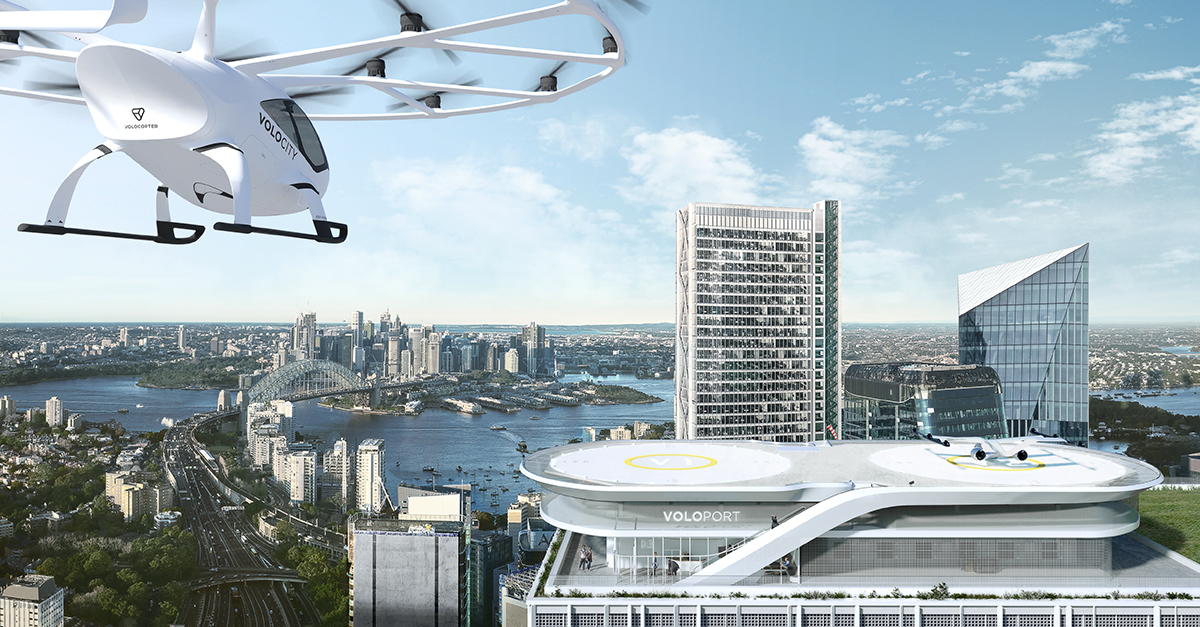
Leading urban air mobility (UAM) craft and infrastructure company Volocopter has unveiled its VoloPort concept that it says will serve as a reference for – or itself be adopted in use as – the vertiports enabling future operation of electric vertical takeoff and landing vehicles (eVTOL).
In its announcement, Germany-based Volocopter calls VoloPort a “handbook for the physical infrastructure supporting” eVTOL flights. Elsewhere, however, it describes the vertiport innovation more as an architectural and construction kit for buildings facilitating UAM services like air taxis and delivery drones. Though clearly also offering a potential reference for do-it-yourself-minded actors in the sector, Volocopter pointedly calls VoloPort “a ready-made, compact, and functionally independent urban vertiport concept” designed for quick setup as affordable and efficient hubs of aerial activity.
Rather than a how-to guide, then, the VoloPort offer seems more angled toward clients looking for turnkey vertiport solutions that can take most of the conceptualizing and organizational work out of erecting eVTOL flight facilities.
“The VoloPort handbook is based on a thorough assessment of the infrastructure and its operational concept,” the Volocopter press release says. “Parties interested in partnering with Volocopter to build and operate UAM infrastructures, such as cities and municipalities, investors, businesses, or construction companies, are eligible to request this handbook from Volocopter.”
As such, the VoloPort service seems intended to reinforce Volocopter’s existing roots in the facility aspect of the UAM sector. In doing so, the company appears to be moving to raise its profile in the vertiport side of future eVTOL operations – a segment in which the UK’s Skyports has scored a series of recent coups – to the same world-leading level as in craft production. Earlier this month, for example, Volocopter announced it had formed a joint venture with the futuristic smart city Noem to oversee and operate its public UAM networks and structures.
The company says its modular VoloPort vertiport system can be shifted to adapt to differing business sizes, targeted customer groups, and types of eVTOL aircraft operations. It’s described as capable of fitting into even tight urban settings – with the smallest version covering the space of two tennis courts. It’s also said to be easily expandable by adding additional sections to increase landing pads, workspace, and transfer areas. Volocopter says the “handbook” offers clients:
- Cost-efficient, modular, and flexible construction design adaptable to available land, sea, or above infrastructure spaces.
- Optional configurations for single level or stacked structures. Structures can be prefabricated and quickly dismantled, if required.
- Fully operational as a stand-alone vertiport equipped with a state-of-the-art regulatory framework. Compliant with eVTOL aircraft design, performance data, and ground handling needs (e.g., charging, firefighting and rescue, and maintenance).
- Smooth and safe customer journey with a consistent brand presence in the designed space.
Volocopter introduced its first full-scale eVTOL vertiport concept in Singapore in 2019. Despite being better known for its advances in the production of UAM aircraft more recently, it has continued working with a wide range of national and international civil aviation administrations to shape the development of safe and effective vertiports, and adopting the most harmonized global standards possible.
That combination of business and consulting activity, says Volocopter CEO Florian Reuter, inspired the creation and launch of the VoloPort vertiport concept as eVTOL services draw near.
“Thanks to the collaboration with our partners and our internal expertise, I am delighted to demonstrate once again how we are leading the space by offering a tangible solution on the infrastructure side of the UAM ecosystem,” he said. “We are looking forward to partnering with interested parties around the globe to hasten the development of a sustainable UAM vertiport network, and I am excited to soon see our VoloPorts in operation.”
FTC: We use income earning auto affiliate links. More.




Comments